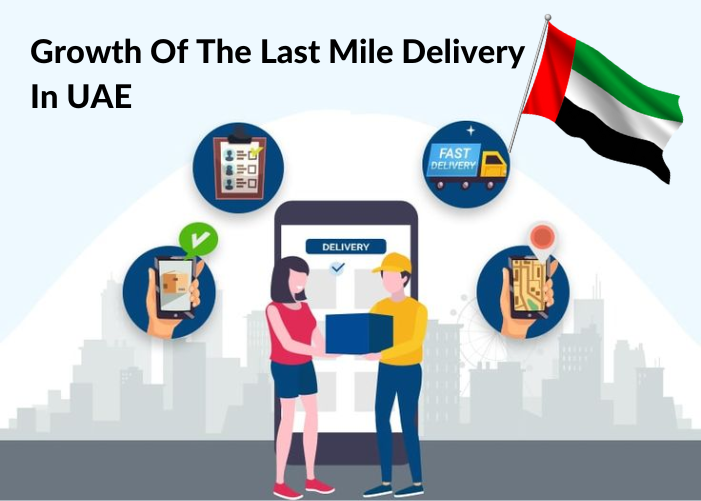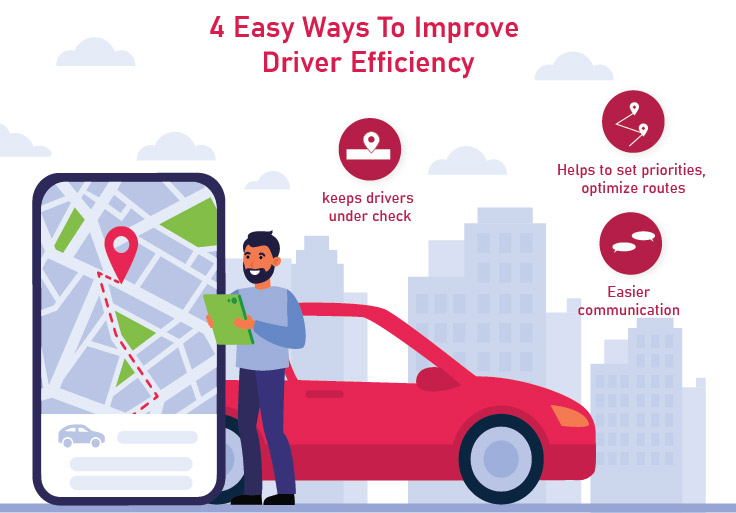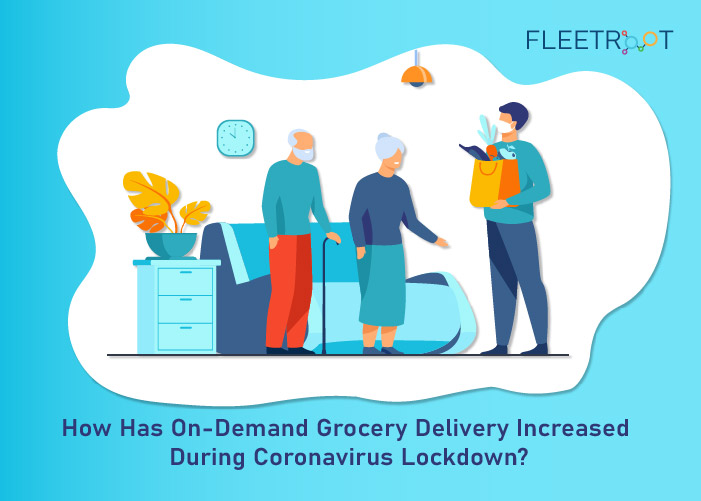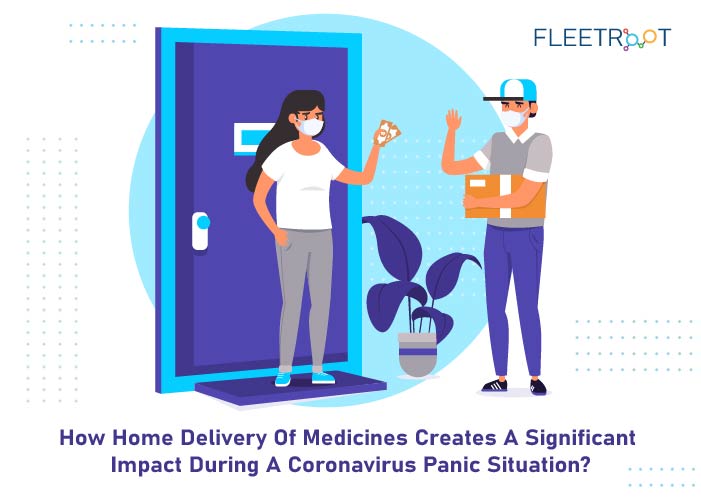Executive Summary Tech giants like Amazon, Walmart, Uber, Netflix (etc) have fuelled the advent of the modern “On-Demand” economy – we are in the age of “instant gratification”. Everything is faster, cheaper, better, and customized.
The Supply Chain and Distribution industry is perhaps those that have been disrupted – revolutionized – most. “24-hr delivery”, “1-hr delivery” is now par for course!
The rapid growth of eCommerce has been the driver, too, and has led to the last leg of the delivery chain – ie Last-Mile Delivery- assuming even greater importance since it is directly responsible for Customer Satisfaction, fulfillment, and, ultimately, profitability.
In the UAE too, Logistics and Last Mile Delivery providers are seeing an opportunity, being fuelled by the growth of a rapid shift to online buying.
Businesses today: disruption is the norm Back in the day, the trusty “Letter” – handwritten or on a typewriter – was the premier method of communication. However, technological changes drove global letter volumes downward and disrupted the postal sector completely. Nowadays, you’d find it difficult to even find someone that “writes letters” to another person!
Innovation is omnipresent, change is constant – buyer behavior, consumer expectation, methods of conducting business- everything is in a state of constant flux.
One such driver of sweeping change in the way we live, consume products and services, and conduct business is the advent of the eCom model. Among all the eco-systems and business models that eCom has impacted, the Logistics and Supply Chain business sits at the very top.
Although the technological advances of the 21st century had put the Supply Chain industry through deeply transformational processes, recent innovations brought about by tech-driven market leaders such as Amazon, Uber, Walmart, Airbnb (etc) have established an “On-Demand” economy.
Now, everything must be cheaper, faster, better, and personable. Delivery options such as “24-hr delivery” and “1-hr delivery” that would have been unimaginable till recently are now the norm. Importantly, consumers are even willing to pay a premium for these services.
“Last Mile Delivery”: last, but not least!:
Last-Mile Delivery, literally, is the last leg of the delivery chain. Given the above scenario ie the rapid growth of eCom, it is among the fastest growing areas in Supply Chain.
Last-Mile Delivery is the all-important factor for positive – or, negative- Customer Experience since it is the touch-point between a company and its customers. The explosive growth of eCom businesses has made Last-Mile Delivery indispensable for creating a positive Customer Experience since it is the ‘face’ of the company that the customer sees.
Last Mile Delivery during Covid-19: duress also brings opportunity The Covid-19 situation further accelerated the demand for ‘safe shopping’. Consumers relied entirely on online platforms – from groceries, household products, medicines, apparel, meals…the list is endless.
While this suddenly created severe pressure on the Supply Chain and Last-Mile Delivery services, it also gave them the opportunity to improve. As a result, it has spawned an entirely new generation of firms that operate in Last-Mile Delivery.
This is also true for firms offering such services in the Middle East – both, startups and established organizations.
Last Mile Delivery in the UAE: opportunity and growth
One may not associate the Middle East with eCom, with driving innovation, or even with making large investments into startups, but there are signs that indicate a growing change:
- The Middle East eCom market is looking to grow by 16% over the next few years. With an increasing number of players, it is also becoming more competitive (Fitch Solutions)
- The UAE Ministry’s Annual Investment Meeting (AIM) that connects investors with startups, stated that Dubai is the world’s leading destination for startups followed by Singapore, Norway, Germany, and Sweden
- 69% of UAE startups are marketplaces (e-Com, SaaS, infrastructure). 52% of these are B2C ventures with 90% headquartered in Dubai.
- Socio-economic factors provide the growing potential for eCom eg. 30% of the population in MENA (the Middle East and North Africa) is between ages 15-29
- Deep internet penetration (65%) and convenient smart phone availability is another supporting factor.
In the UAE – just like globally – the CEP industry (Courier, Express, and Parcel) is, perhaps, among the top 3 industries to be revolutionized by the advent of eCommerce and Digitization.
Dubai Police, Dubai Economy, and Visa conducted an in-depth study across consumers in Abu Dhabi, Dubai, Riyadh, Jeddah, and Cairo in the immediate aftermath of the pandemic. The results indicate that the UAE eco-system is primed for behavioral change in favor of online commerce.
Since the outbreak of the pandemic, shopping at retail stores had gone down by 68%. About 50% of the respondents claimed to “shop online more than earlier”. As seems the case globally, such changes in buyer behavior can now be assumed as the “New Normal”
About ½ surveyed consumers in UAE expect to spend more in the immediate future as against 1/3rd consumers saying so in other regions including Germany, UK, France, Netherlands, and Sweden. Interestingly, 2/3rd consumers in Cairo planned to increase spends in the coming months. In Dubai, that figure was nearly 40%.
Startups in the UAE: the beginning of a new era?
As mentioned earlier, the growth of eCom has made the Last-Mile Delivery even more important, and, numerous startups in the region are now focusing on the last leg of the supply chain.
Startups, as well as established companies that are innovating to provide a wide range of efficient services in this leg by using the benefits of technological advances, are often referred to as “3PLs”, or, “Third Party Logistics”. These 3PLs have become an indispensable part of the supply chain, and particularly, with regards to online fulfillment.
Some companies in the UAE that are innovating in this space include:
1) FODEL
- Pre-Series funding of $2.6 million
- Proprietary technology that builds “click & collects” network
- 1,000 pickup locations in the UAE. Integrated with retailers eg JollyChic, Choithrams
- Real-time tracking of parcels. Offer customers full shipment visibility and control
- Expansion plans include Saudi Arabia (currently 800 pick-up locations)
2) Premier Logistics
- Dubai-based Premier Logistics is geared to launch a unique service called “PUDO” (Pick-Up & Drop-Off) to fulfill Last-Mile Delivery. Utilizes unused (unrequired, redundant) local office spaces for storage
- In collaboration with Parcelly UK. Available at 1,000+ global drop-off locations
- Delivery locations range from grocery stores within residential complexes, pick-ups from a gym or mart – the options are limitless
- Since endless parcels aren’t being delivered to endless people individually, Premier Logistics is looking to bring down the environmental impact
3) Aramex
- Not just startups but large established firms like Aramex are also innovating at the Last- Mile to fulfill the rapidly rising eCom requirements of the UAE
- Introduced ‘Aramex Fleet’, a crowd-sourced delivery platform that leverages Saudi Arabia’s sharing economy by connecting its citizens to flexible last-mile delivery work
- In 2016, Aramex invested in the U.K. firm What3Words as part of its last mile delivery strategy and integrated it within its global eCom solutions
4) Emirates Post
- Official postal operator in the UAE
- Largest domestic service provider. In excess of 90 customer centers, elaborate daily network operational in all seven emirates
- Leading express provider that offers flexible, cost-effective courier and Last-Mile Delivery solutions (international and domestic)
- Full support to businesses for their fulfillment and e-commerce requirements. Integrated, automated back-end solution
- 45% growth in last-mile delivery volumes (since 2020)
- Collaboration with Amazon is a great success with 1mn+ Amazon parcels delivered. Recognized as the #1 Last-Mile Partner in UAE & North Africa
Challenges
Like any business, Last-Mile Delivery companies also face some challenges including:
- Conservative regional policies
- Fluctuating demand patterns
- Operational costs
- Daily operational roadblocks and challenges
- With increasing competition, longevity is a must for success
The UAE government is also looking to regulate matters – it recently provided a framework for the use of drones, robots (etc) for use in Last-Mile Delivery fulfillment.
Conclusion: It appears as though the UAE is moving toward becoming a hub for startups and eCom firms. Local preference for online purchasing has meant more deliveries and the rise of Last-Mile Delivery services. Therefore, firms operating in this space would do well to keep an ear to the ground and stay focused – they are likely in a market ripe with opportunity!
Last Mile Delivery Management Software offers businesses to serve huge customer expectations.




